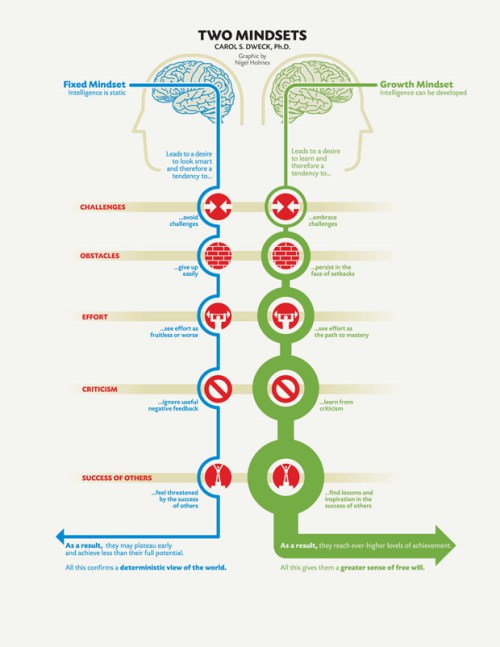By Raul Sanchez, San Francisco MBA
It is fact: technology is disrupting existing industries worldwide. Innosight, a growth strategy consulting firm, predicts that about 50% of the companies in the S&P500 will be replaced within the next 10 years. With industries constantly changing, what competencies must students and employees embrace to succeed today’s global economy? Can these competencies be developed? And if so, is training widely accessible? Advances in technology and studies in both neuroscience and psychology, provide people from all over the world, and from any background, with the opportunity to be equally prepared to succeed in today’s economic market.
Research done by Carol S. Dweck, psychologist at Sandford University, explores the role of mindset in student’s motivation, development, and overall school achievement. According to Dweck, having a growth mindset, the belief that intelligence can be developed, is directly correlated to the potential of a student’s success when learning. Moreover, students with a growth mindset go through school and life embracing challenges and accepting failures as a key component of learning. During a study, where the mindset of students entering the 7th grade was analyzed, researchers attempted to determine whether students had a fixed (the belief that intelligence cannot be developed) or a growth mindset. Grades, as well as student attitude towards learning was monitored during the two consecutive years. The findings created a huge surprise, as the only difference between the two group of students was their mindset. Furthermore, the students with the growth mindset had significantly better grades and overall attitude during their school years. K. Anders Ericson, from Florida State University, has done extensive research on the psychology of expertise and human performance. His research negates the common belief that a high level of expertise in almost any domain can only be achieved by a few, innately talented people. Moreover, his studies show that performance is closely related to skills acquired during the practice of a particular domain rather than by innate intelligence, memory capacity, or perceptual functioning. As a conclusion of these studies, the psychologists suggest that human potential can be unleashed through the power of proper training.

With 3.7 billion internet users, half of the world’s population now has access to the World Wide Web. Moreover, it is estimated that by 2020, over 4.2 billion people will be online. It is true that not everything found on the internet features valuable content, however the number of high quality online education providers has increased dramatically over the past couple of years. With the growth of Massive Open Online Courses (MOOC), lectures from renown professors and industry professionals are now accessible to millions of people. Moreover, there is availability of a variety of subjects and disciplines to study; from Computer Science to Finance, Arts and Psychology. Critics of MOOC argue that the completion rate of online courses is very low, thus diminishing the potential impact that these platforms may have. However, with the amount of information available online, people use different sources to learn about a specific subject without the need for a grade or a certificate of completion.
In conclusion, with 50% of the S&P500 being disrupted within the next 10 years, millions of people will be displaced out of their current occupations. No one knows what the jobs of the future may look like. However, to remain relevant in today’s global economy, interest parties must engage in continuous learning. As such, if the tools available nowadays are properly combined, a new generation of passionate, driven, and innovative citizens can emerge.
